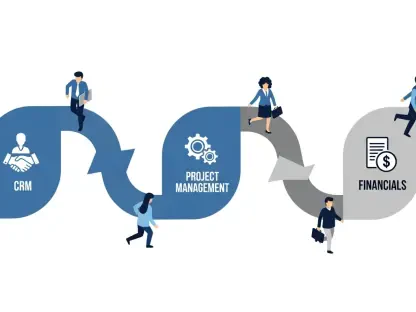Introduction to a Data-Driven Revolution
In an era where enterprises generate and process data at an unprecedented scale, the integration of artificial intelligence (AI) into workflows has become a cornerstone of operational efficiency. Imagine a scenario where a multinational corporation struggles to streamline its data analytics across diverse platforms, losing critical time to manual processes, and facing challenges that countless organizations encounter daily, highlighting the urgent need for innovative solutions to automate and optimize data management. Teradata, a long-standing leader in data analytics, has emerged with a compelling answer through its Agent Builder, a suite designed to harness open-source AI frameworks. This report delves into how this tool redefines enterprise AI automation by blending open-source flexibility with robust data governance, setting a new standard in a competitive industry.
The current state of the data management and AI sector reveals a dynamic landscape, marked by rapid adoption of automation technologies. Enterprises are increasingly turning to AI to handle complex workflows, from predictive analytics to real-time monitoring. Amidst this transformation, major players like Snowflake, Databricks, Salesforce, and ServiceNow vie for dominance with proprietary systems, while open-source technologies gain traction for their adaptability and cost-effectiveness. Teradata’s strategic pivot toward leveraging these open-source ecosystems with Agent Builder positions it uniquely, offering a fresh perspective on balancing innovation with enterprise-grade reliability.
This analysis aims to unpack the intricacies of Agent Builder, exploring its core features, open-source integrations, and the challenges of implementation. It will also navigate the regulatory landscape and forecast future trends, providing a comprehensive view of how Teradata is shaping the intersection of AI and data management. By examining these elements, the report seeks to illuminate the broader implications for enterprises striving to remain agile in a data-centric world.
Understanding Teradata’s Role in Data Management and AI
Teradata has long been recognized as a pivotal force in data management and analytics, delivering solutions that empower organizations to derive actionable insights from vast datasets. With a legacy of innovation, the company has built a reputation for providing scalable, secure platforms that support critical business decisions. Its expertise in handling complex data environments makes it a trusted partner for enterprises across industries, from finance to healthcare, seeking to maximize the value of their information assets.
The advent of AI automation has transformed modern enterprise workflows, enabling faster, more informed decision-making while reducing human error. Recognizing this shift, Teradata introduced Agent Builder, a strategic tool designed to create multi-agent AI systems tailored to specific business needs. This initiative reflects a forward-thinking approach to addressing the growing demand for automation, positioning Teradata as a frontrunner in integrating AI into data management practices with a focus on customization and efficiency.
In a competitive arena, Teradata stands alongside giants such as Snowflake, Databricks, Salesforce, and ServiceNow, each offering distinct approaches to AI and analytics. While many competitors rely on proprietary ecosystems, Teradata differentiates itself by embracing open-source technologies, a trend gaining momentum in the industry. This strategic choice not only enhances flexibility but also aligns with the broader movement toward collaborative, community-driven innovation in AI and data analytics, appealing to organizations wary of vendor lock-in.
Exploring Agent Builder: Features and Open-Source Integration
Core Components and Capabilities
Agent Builder, Teradata’s latest offering, comprises several key components designed to streamline AI-driven automation for enterprises. Its intuitive user interface simplifies the creation of multi-agent workflows, making it accessible even to non-technical users. Additionally, features like context intelligence, integration with the MCP Server, and a library of pre-built agents provide a robust foundation for addressing diverse business challenges, from data analysis to system monitoring.
Context intelligence stands out as a critical element, utilizing expert prompts and large language model (LLM) APIs to ensure that AI agents are deeply rooted in enterprise-specific data. This capability allows for precise, relevant outputs tailored to unique organizational contexts. Meanwhile, the MCP Server enhances this functionality by supporting advanced analytics, governance, and tools such as the Enterprise Feature Store and retrieval-augmented generation (RAG), ensuring that data interactions remain secure and aligned with business objectives.
The suite also includes pre-built agents, such as the SQL agent for translating natural language into executable queries, the data science agent for building machine learning pipelines, and the monitoring agent for optimizing system performance. These templates serve as customizable starting points, enabling enterprises to rapidly deploy AI solutions without starting from scratch. Such versatility underscores Agent Builder’s role as a practical tool for meeting varied enterprise demands with minimal setup time.
Strategic Use of Open-Source Frameworks
Teradata’s adoption of open-source frameworks marks a deliberate shift from building proprietary systems, focusing instead on proven third-party tools. Currently, Agent Builder integrates platforms like Flowise and CrewAI, with plans to incorporate LangChain and LangGraph in the coming months. Future integrations with Nvidia tools and major cloud providers such as AWS, Microsoft, and Google are also anticipated, broadening the suite’s compatibility and reach across different environments.
This reliance on open-source ecosystems offers significant advantages, notably in accelerating time to market. By tapping into established communities and modular components, Teradata can focus on enhancing its core strengths, such as data governance and contextual understanding, rather than investing heavily in standalone AI development. Industry analysts note that this approach allows for rapid iteration and adaptation, keeping pace with the fast-evolving AI landscape while maintaining a competitive edge.
Analyst insights further highlight the benefits of modular open-source components over proprietary alternatives. Such frameworks provide a level of flexibility that proprietary systems often lack, enabling enterprises to mix and match tools based on specific needs. This modularity not only reduces development costs but also fosters innovation by leveraging the collective advancements of global developer communities, positioning Teradata as a facilitator of cutting-edge AI solutions.
Challenges in Implementing Open-Source AI Solutions
Implementing open-source AI solutions, while advantageous, presents notable hurdles for enterprises. Compatibility issues often arise when integrating diverse frameworks, potentially disrupting seamless operation across systems. Scalability also poses a concern, as open-source tools may not always handle the high-volume demands of large organizations without significant customization, leading to unforeseen technical challenges.
Beyond technical barriers, enterprises express apprehension about data security and governance when adopting open-source technologies. The inherent openness of these tools can expose vulnerabilities if not properly managed, while the complexity of tailoring them to specific workflows adds another layer of difficulty. These concerns underscore the need for robust safeguards and expertise to ensure that AI implementations do not compromise critical data integrity or regulatory compliance.
Teradata addresses these challenges through tight integration with the MCP Server, which provides comprehensive governance controls and semantic access to enterprise data. By embedding strong security measures and curated prompts within Agent Builder, the company mitigates risks associated with open-source adoption. This balance between the flexibility of open-source frameworks and the reliability required for enterprise-grade deployments demonstrates a nuanced strategy to overcome common implementation obstacles.
Navigating the Regulatory and Compliance Landscape
The regulatory environment for AI and data management in enterprise settings is increasingly stringent, with global standards evolving to address privacy and ethical concerns. Organizations must navigate a complex web of requirements, from data protection laws to industry-specific mandates, ensuring that AI solutions adhere to these guidelines. This landscape presents a significant consideration for any technology deployment, particularly when integrating open-source components that may lack inherent compliance mechanisms.
Teradata’s Agent Builder places a strong emphasis on data governance and security, especially in its use of open-source integrations. By leveraging the MCP Server’s capabilities, the suite ensures that data interactions are monitored and controlled, aligning with enterprise compliance needs. This focus on safeguarding sensitive information builds trust among users, addressing a critical aspect of regulatory adherence in AI automation.
Moreover, Teradata’s agnostic approach to infrastructure avoids the pitfalls of vendor lock-in, offering enterprises the freedom to adapt to changing compliance demands without being tied to a single provider. As AI regulations continue to develop, this flexibility becomes even more valuable, allowing organizations to pivot as needed. The ability to maintain compliance while harnessing open-source innovation positions Teradata as a forward-looking partner in navigating these challenges.
Future Outlook for Teradata and Open-Source AI in Enterprises
Looking ahead, Agent Builder is poised to make a significant impact in the enterprise AI market, with analysts expressing optimism about its adoption potential. Feedback suggests that organizations already experimenting with open-source AI but struggling to scale will find value in Teradata’s blend of pre-built agents and trusted data management. This combination addresses a critical gap for leaders seeking production-ready solutions without extensive in-house development.
Emerging trends in open-source AI, such as the rise of collaborative platforms and community-driven advancements, further enhance Teradata’s positioning. The company appears well-equipped to capitalize on these shifts by continuing to integrate cutting-edge tools and maintaining an adaptable framework. This proactive stance ensures that Agent Builder remains relevant amidst rapid technological progress, appealing to enterprises prioritizing innovation.
Potential disruptors, including the introduction of novel open-source tools or changing enterprise preferences for AI solutions, could influence Teradata’s trajectory. Staying ahead will require ongoing innovation and responsiveness to market dynamics. Trust, flexibility, and a commitment to addressing enterprise pain points will likely shape Teradata’s future as a leader in AI automation, solidifying its role as a key player in this evolving field.
Reflecting on Teradata’s Strategic Path
Looking back, this exploration revealed how Teradata’s Agent Builder harnesses open-source AI to address enterprise automation needs with a unique blend of flexibility and reliability. The detailed analysis of its features, challenges, and regulatory considerations painted a picture of a tool that balances innovation with practicality. This strategic integration of open-source frameworks stood out as a defining factor in Teradata’s approach.
For enterprises moving forward, considering Agent Builder as a platform offers a pathway to scalable AI solutions. A recommended next step involves assessing internal data governance readiness to ensure seamless integration. Engaging with Teradata to customize pre-built agents could also unlock tailored efficiencies.
Beyond immediate adoption, stakeholders should monitor evolving open-source trends and regulatory shifts to stay aligned with industry standards. Collaborating with technology partners to address scalability concerns could further enhance deployment outcomes. These actionable considerations provide a roadmap for leveraging Teradata’s innovation in a competitive landscape.









